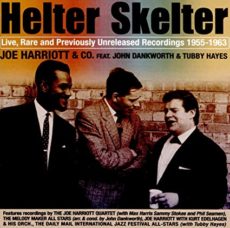
Daily Dose Of Jazz…
Joseph Arthurlin Harriott was born in Kingston, Jamaica on July 15, 1928. Harriott was educated at Alpha Boys School, an orphanage in the city where he learned to play the clarinet, the instrument that was assigned to him shortly before his tenth birthday. He took up the baritone and tenor saxophone while performing with local dance bands before settling on the alto saxophone.
Moving to London, England as a working musician in the summer of 1951 at the age of 23 as a member of Ossie Da Costa’s band, he initially began as a bebopper, and also became a pioneer of free-form jazz. Harriott was part of a wave of Caribbean jazz musicians who arrived in Britain during the 1950s, including Dizzy Reece, Harold McNair, Harry Beckett and Wilton Gaynair.
Deeply influenced by Charlie Parker, he developed a style that fused Parker with his own Jamaican musical sensibility, most notably the mento and calypso music he grew up with. During the 1950s, he had two long spells with drummer Tony Kinsey’s band, punctuated by the membership of Ronnie Scott’s short-lived big band, occasional spells leading his own quartet and working in the quartets of drummers Phil Seamen and Allan Ganley.
Harriott began recording under his own name in 1954, releasing a handful of E.P. records for Columbia, Pye/Nixa and Melodisc throughout the 1950s. However, the majority of his 1950s recordings were as a sideman with the musicians previously mentioned, also backing a diverse array of performers, from mainstream vocalist Lita Roza to traditional trombonist George Chisholm to the West African sounds of Buddy Pipp’s Highlifers. Harriott also appeared alongside visiting American musicians during this period, including a “guest artist” slot on the Modern Jazz Quartet’s 1959 UK tour.
Forming his own quintet in 1958, Joe’s hard-swinging bebop was noticed in the United States, leading to the release of the Southern Horizons and Free Form albums on the Jazzland label. By now firmly established as a bebop soloist, in 1960 Harriott turned to what he termed “abstract” or “free-form” music. During the late 1960s he and violinist John Mayer developed Indo-Jazz Fusion – an early attempt at building on music from diverse traditions. His work in 1969 was to be the last substantial performance of his career.
While he continued to play around Britain wherever he was welcome, no further recording opportunities arose. He was virtually destitute in his last years and ravaged by illness. Alto saxophonist and composer Joe Harriott passed away from cancer on January 2, 1973.

More Posts: bandleader,composer,history,instrumental,jazz,music,saxophone

